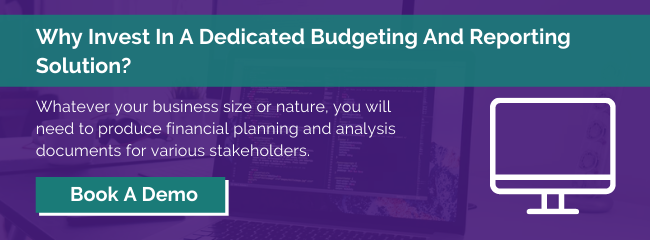Contents
- Why Financial Consolidation Software is essential for Your Business and its Subsidiaries
- What are the Challenges of Manual Financial Consolidation?
- What are the Benefits of Financial Consolidation Software?
- Reasons why Reliable Financial Consolidation Software is Important
- What are the Key Considerations when selecting Financial Consolidation Software for your business?
- How we can help to Improve your Financial Consolidation and Reporting
Why Financial Consolidation Software is essential for Your Business and its Subsidiaries
Financial consolidation is a critical process for businesses and corporate groups with multiple subsidiaries. It involves combining the financial statements of these subsidiaries into a single, consolidated report that reflects the overall financial health of the organisation.
However, manual consolidation can be time-consuming and complex to manage, whereas financial consolidation software plays a vital role in streamlining and enhancing the process.
In this guide, we will explore the problems associated with manual consolidation, the benefits of using financial consolidation software, and the key considerations when choosing the right software for your business and its subsidiaries.
.webp?width=1124&height=777&name=Account-Ability%20eBook%20-%20financial%20consolidation%20(1).webp)
What are the Challenges of Manual Financial Consolidation?
Financial and performance data plays a crucial role in informed decision-making in modern business. However, some companies rely on outdated manual methods, such as collecting and consolidating data from different branches or subsidiaries using spreadsheets. Manual consolidation consumes valuable resources and can take many weeks to resolve, and identifying the root causes of errors is difficult if multiple teams and systems are involved in the process.
So, what are the specific pain points that businesses face when undertaking manual financial consolidation?
.webp?width=650&height=259&name=Account-Ability%20eBook%20-%20financial%20consolidation%20(3).webp)
1. Time Pressure
Time pressures are a significant pain point when it comes to the manual financial consolidation of accounts. Internal and external deadlines create a sense of urgency for finance teams to complete the consolidation within a specified timeframe. Data must be gathered from multiple sources and calculations performed and double-checked for accuracy, all of which can be incredibly time-consuming. The dependency on manual processes can lead to delays if any step in the process is not completed on time, resulting in penalties for late reporting.
2. A Lack of Resources
A lack of resources can exacerbate the time pressures that finance teams face when conducting manual consolidation. In many businesses, only a few people may have the necessary knowledge and expertise to manage the complexities of the process; the reliance on a small team can lead to bottlenecks and delays. The absence of backup resources or alternative personnel to handle the task further increases the pressure on the limited number of individuals responsible for financial consolidation.
3. The Potential for Error
The manual processes involved in financial consolidation also increase the potential for errors. Complex calculations, extensive data sets, and the need for meticulous attention to detail can cause mistakes, the most minor of which can have significant consequences that impact the accuracy of financial reports and lead to incorrect decision-making. Errors can be difficult to trace, so precious time and resources are taken up identifying and resolving the cause.
4. An unnecessarily Complex Process
Group structures and financial regulations are subject to change, requiring adjustments in the consolidation process. Each step of the process must be completed in a precise order and, until one step is completed, it is not possible to move on to the next. This sequential nature of the process can prolong the time it takes to complete manual financial consolidation
The financial consolidation of group results is critical to monitoring group performance and establishing its value. At Account-Ability, our software solution, Corporate Planner, can simplify and accelerate the process of financial consolidation, making it a cost-effective alternative to manual processes with a wealth of benefits:
Improved Efficiency
Our financial consolidation software integrates seamlessly with Enterprise Resource Planning (ERP) systems, enabling automated data extraction and eliminating the need for time-consuming and repetitive manual data entry.
The integration with ERP streamlines the consolidation process, saving time and effort. The software also provides a defined workflow, ensuring that each step is completed in the correct order to further enhance process efficiency.
%20V2.webp)
%20V2.webp?width=700&height=692&name=Account-Ability%20eBook%20-%20financial%20consolidation%20(4)%20V2.webp)
More assured accuracy
Reliable financial consolidation software ensures compliance with important accounting standards, such as UK Generally Accepted Accounting Principles (GAAP), International Financial Reporting Standards (IFRS), and many other reporting frameworks, local and sector-specific.
By following standardised rules and calculations, the software minimises the risk of errors and discrepancies in the consolidated financial statements. Also, the software includes integrated internal checks to validate data accuracy and identify any inconsistencies or anomalies so that these can be adjusted.
Enhanced Visibility and Auditability
Financial consolidation software delivers enhanced visibility of subsidiaries’ financial data. Users can drill down to individual transactions to comprehensively understand the financial relationships and transactions within the organisation. The software also generates clear reports of intercompany eliminations to avoid ambiguity or confusion. With comprehensive in-built reporting features, businesses can easily generate customised reports for different stakeholders and achieve outstanding levels of transparency.
.webp?width=800&height=317&name=Account-Ability%20eBook%20-%20financial%20consolidation%20(6).webp)
Forecasting and Scenario Consolidations
Financial consolidation software facilitates forecasting and scenario consolidations so businesses can model corporate changes, such as sales and acquisitions, and project the impact on the group’s financial position. This capability enhances decision-making by providing insights into potential outcomes and enabling proactive planning for future growth.
Establishes an Identifiable and Auditable Process
By implementing financial consolidation software, businesses can establish a structured and auditable process. Our software ensures that each step of the consolidation process is traceable and documented, creating a detailed audit trail for compliance purposes and instil confidence in stakeholders and investors. Additionally, the software creates a system that can be easily handed over to new employees if key staff leave the business, thus ensuring continuity.

Is Your Company Burdened By Manually Consolidating Your Financial Accounts?
Gain a unified view of your entire organisation's financial health and discover how financial consolidation software streamlines subsidiary data management and simplifies reporting for a clearer financial picture.
In this guide, we explore:
→ Problems associated with manualconsolidation,
→ Benefits of using financial consolidation software.
→ Key considerations when choosing the right software for your business and its subsidiaries.
Ready to explore how financial consolidation software could help your business? Complete the form on this page to get a copy sent straight to your inbox!
Get Your Free Copy Here
4 Reasons why Reliable Financial Consolidation Software is important
Reliable financial consolidation software is important to businesses for several key reasons:
1. To meet Modern Standards of Governance
Governance standards are stringent in modern business and for good reason. Governance helps to ensure that companies are stable, productive, and able to seize growth opportunities without exposing themselves to undue risk. It also ensures organisations are trustworthy, increasing confidence among investors. With reliable financial consolidation software, businesses can ensure compliance with governance standards by providing accurate and transparent financial reporting. Also, it helps them to adhere to regulatory requirements and demonstrate a commitment to ethical practice.
2. To provide accurate Reports to the Board and External Stakeholders
Financial consolidation software plays a critical role in reporting financial information to the board of directors and external stakeholders. These reports provide a comprehensive view of the organisation's overall financial performance, enabling directors and business leaders to make informed decisions and strategic plans. By using reliable software, businesses can ensure the accuracy, integrity, and timeliness of their reports to build trust and confidence among stakeholders.
.webp)
3. To meet Lending Requirements
For businesses with bank loans or finance arrangements, financial consolidation software is essential to meet lending requirements. Accurate and transparent financial reporting demonstrates the company’s ability to fulfil its financial obligations and assures the lender of its stability. Furthermore, when seeking new sources of finance, financial consolidation software, which produces accurate and consistent reports, can enhance the credibility of the business to potential lenders or investors.
4. To comply with Financial Reporting Regulations
Financial consolidation software ensures that businesses comply with financial reporting regulations, such as UK GAAP. By automating the consolidation process and integrating these reporting standards, the software can generate accurate financial statements that adhere to regulatory guidelines. Compliance is crucial to avoid penalties, legal issues, and reputational damage that may arise from a failure to observe the regulations.
.webp)
.webp)

What are the Key Considerations when selecting Financial Consolidation Software for your business?
Selecting the right financial consolidation software for your business is crucial to ensure a seamless and effective consolidation process. What should you consider when comparing product options?
The ability to manage Multiple Group Structures and Subsidiaries
A robust financial consolidation software solution should have the capability to handle complex group structures and multiple subsidiaries and support consolidation at various levels, allowing for a comprehensive view of the organisation's financial performance.
The ability to process Multiple Currencies and Historic Rate
If your business operates in multiple countries or processes transactions in different currencies, it is vital to choose financial consolidation software that can handle multi-currency consolidation. The software should support the conversion of financial data into a common currency, as well as manage historical exchange rates to ensure accurate consolidation and reporting.
.webp?width=800&height=616&name=Account-Ability%20eBook%20-%20financial%20consolidation%20(10).webp)
The ability to handle Minority Interests and Joint Ventures
In cases where your business has minority interests or joint ventures, it is important to select software that can manage the complexities associated with such arrangements. The software should be able to manage equity accounting and accurately consolidate financial data from these entities to ensure the accurate representation of the organisation's overall financial position.
-1.png)
A well-defined Process Map
Your chosen software should offer a clear and structured workflow, guiding users through each step of the consolidation process to ensure consistency, reduce the risk of errors, and streamline the overall consolidation process.
Internal Balance Checks
A reliable financial consolidation software should have built-in internal balance checks to identify inconsistencies or errors within the data and ensure the integrity of consolidated financial statements. Internal balance checks are crucial in maintaining data quality and mitigating the risk of errors.
Multiple Reporting Formats
The capability to produce multiple reporting formats is key as this allows reports to be customised to meet the specific requirements of different stakeholders, such as managers, directors, auditors, or regulatory authorities. Comprehensive, tailored reports enhance transparency and facilitate effective communication of financial information.
Not reliant on Ongoing External Consultancy
Your chosen software should be secure, reliable, and easy to manage internally, enabling your organisation to have full control and independence over the consolidation process – without the need for constant external system maintenance or updates.
Certified by acknowledged Accountancy Practices
To ensure the reliability and credibility of the financial consolidation software, only consider solutions that are certified by acknowledged accountancy practices or have undergone independent audits. Certification validates that the software meets industry standards and best practices in financial reporting and consolidation.
Link to ERP Pre-Systems
Integration with your existing ERP is crucial for seamless data transfer and consolidation. The financial consolidation software should have the ability to connect and interface with your ERP, enabling automatic data extraction and consolidation, to reduce your team’s manual work and improve efficiency.
Ability to run Forecasts and Scenarios
Consider software that goes beyond the consolidation of historic data, and offers additional functionality, such as forecasts and scenarios. This feature allows businesses to model different financial scenarios, perform what-if analyses, and evaluate the potential impact of business decisions on the consolidated financial position.
.webp)
By considering these key factors when selecting financial consolidation software, your business will benefit from the best solution that meets your specific needs and delivers streamlined, accurate, and transparent financial consolidation.
How we can help to Improve your Financial Consolidation and Reporting
At Account-Ability, we can help your business to overcome many of the pain points of manual financial consolidation, by providing an effective software solution that streamlines and simplifies the process, eliminates errors, saves time and resources, and improves the transparency of your organisation’s finances.
The Corporate Planner financial consolidation system is an out-of-the-box solution for groups that we can set up quickly with your in-house accounting team with ‘full self-serve future development and operation’.
- Hosted on-premises or in the Corporate Planner cloud.
- Provides clear set-up dialogue boxes so that business structures and elimination rules are easy-to-define.
- Imports data directly from your ERP to automate the processing of eliminations.
- Leads users through financial consolidation step-by-step, with the workflow divided into manageable sections.
- Provides clear visual structures, with multiple groups or subgroups, with financial consolidation progress displayed for each reporting period for each company.
- Features standard report templates for rapid implementation and editable templates for GAAP and IFRS reporting.
- Enables users to conduct many other tasks, including simulating company consolidations, altering the group structure after the purchase of companies, and preparing budgets and forecasting consolidated figures.
- Our consolidation solution is certified in accordance with audit standards.
.webp?width=500&height=334&name=Account-Ability%20eBook%20-%20financial%20consolidation%20(11).webp)
Arrange a Free Demo of our Financial Consolidation Software
At Account-Ability, we understand the pain points of consolidating the accounts for multiple subsidiaries, so our financial consolidation solution will streamline and simplify the process, saving you time and money and reducing errors.
To find out more about Corporate Planner and how we can help, please book a free demonstration or call our expert team today on 01242 339213.


.png)
